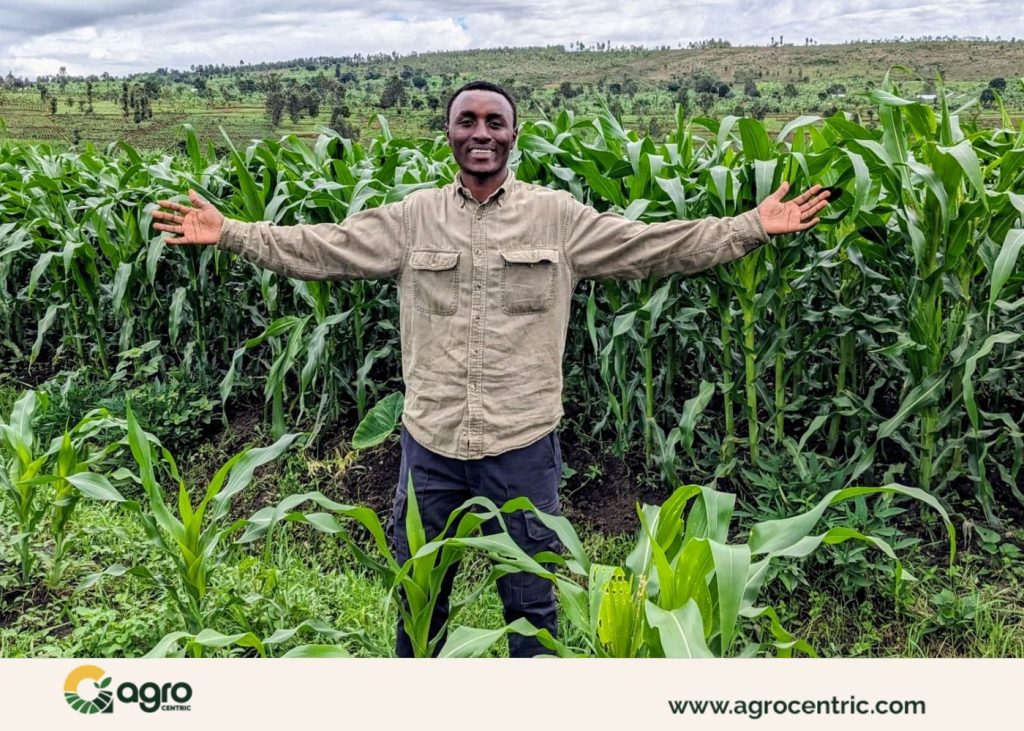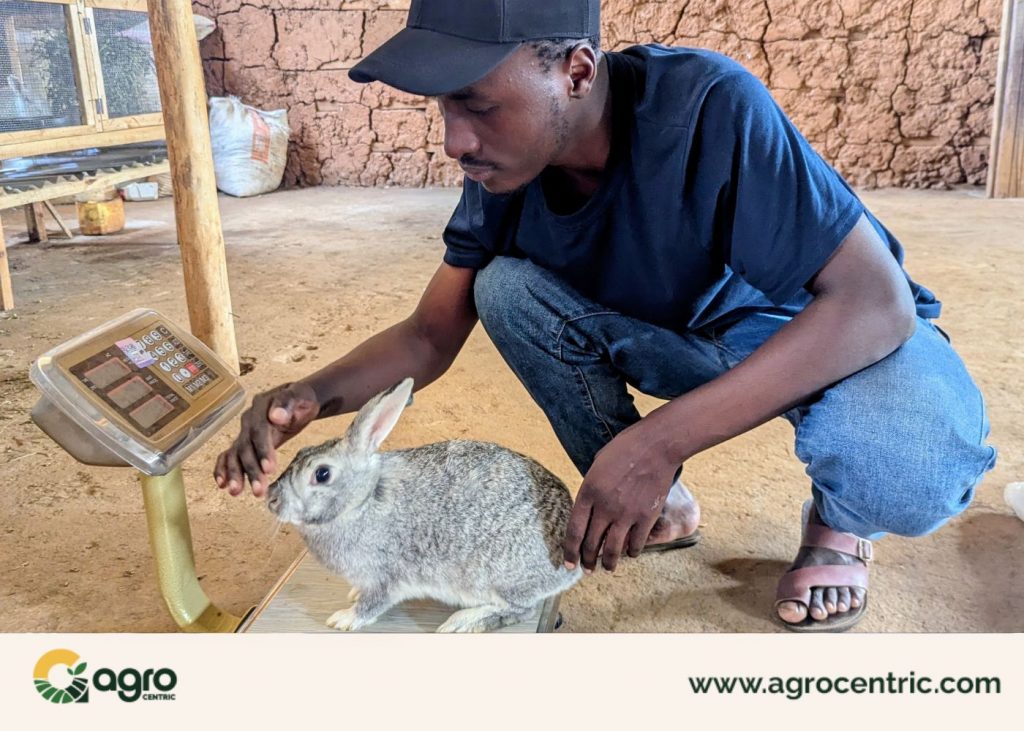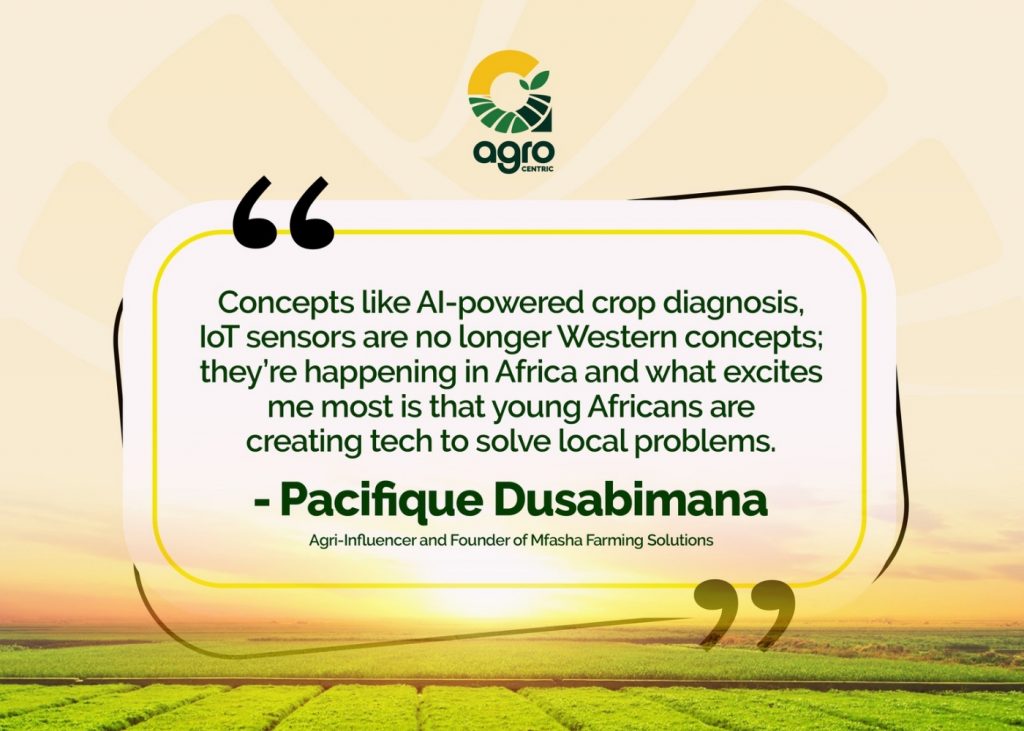
Across Africa, agriculture still battles outdated narratives that discourage youth participation. But Pacifique Dusabimana is helping to rewrite that story.
From his base in Rwanda, this young agri-entrepreneur and digital storyteller is using social media to connect more than 100,000 young people with practical, sustainable farming solutions.
What began as a simple habit of sharing lessons from class has grown into Mfasha Farming Solutions, a platform at the intersection of conservation agriculture, digital advocacy, and youth empowerment.
In this AgroCentric interview, Pacifique opens up about his personal journey, the challenges of turning content into impact, and why he believes the next green revolution in Africa will be youth-led and tech-powered.
For those meeting you for the first time, who is Pacifique? Tell us about your background.
Thank you. If you ask, “Who is Pacifique?” I’m a conservation agriculture professional who graduated from the Rwanda Institute for Conservation Agriculture (RICA) in September 2024.
Beyond my academic background, for almost four years now, I’ve been using social media to inspire young people across Africa to join agriculture. I do this through digital storytelling, creating content around sustainable agriculture practices. Over time, that passion grew into a community of over 100,000 African youth.
I’ve worked with organisations like AGRA (Alliance for a Green Revolution in Africa) and Rwanda’s Ministry of Agriculture to support youth-centred campaigns. One example is the Rwanda Agriculture Show, where I showcased youth innovations in agriculture.
I’m an advocate and a farmer. I recently started rabbit farming and am the founder of Mfasha Farming Solutions. My mission is at the core of everything I do: to redefine African food systems through digital storytelling and inspire youth to farm profitably and sustainably.
That’s inspiring. You mentioned Mfasha Farming Solutions. How did it all begin?
Honestly, I never planned to start something big. It all started in April 2022 when I began posting what I was learning in school on Twitter, just for fun. I had no strategy; no grand vision.
As I shared more, people started engaging. Some were surprised to see how agriculture could look so different. Others told me they were inspired to try the practices I shared. That’s when I realised this was more than just content; it was a platform to influence change.
In October 2022, six months after starting my journey, I founded Mfasha Farming Solutions. The goal was simple: create a space that bridges the gap between digital tools, grassroots farmers, and sustainable practices. Today, Mfasha has grown beyond my initial imagination.

What makes Mfasha Farming Solutions different from other agribusiness platforms?
I believe what sets us apart is our approach. Many platforms talk to farmers, but we talk with them. There’s a huge disconnect between policies, agribusinesses, and smallholder farmers.
At Mfasha, we bring grassroots understanding because I’m not just an influencer; I’m also a farmer. We use digital storytelling to simplify conservation practices, run awareness campaigns (like crop insurance), and shift mindsets. We don’t just promote farming; we make it relatable. With my dream of setting up real-life demonstration farms, people will soon see these practices in action, not just online.
You were still a student when all this started. How did you balance academics and building a platform?
It was tough. At first, I had no clear plan, just passion. In fact, I joined RICA thinking I might later return to study medicine because agriculture didn’t appeal to me growing up. But RICA changed that.
The university’s experiential learning model opened my eyes to agriculture’s potential. We had 1320 hectares of land, irrigation systems, dairy units, everything. I fell in love with agriculture. But balancing was challenging. Sometimes I had to choose between farm visits and assignments. Conferences and speaking engagements often clashed with exams. I learned to maximise weekends and plan better. Most of my work remained digital because farming demands time and resources I didn’t always have.
What inspired you to keep going despite those challenges?
The feedback from people online was my biggest motivation. Seeing someone try out a practice I shared or hearing them say, “You made agriculture look cool,” kept me going. I realised it was bigger than me; it was a movement.
Every entrepreneur faces hurdles. What has been your biggest challenge so far?
Two things stand out: resources and expectations. Financial limitations, like setting up demonstration farms, slowed down some of my plans.
However, another challenge was that people assumed I knew everything because I had a large following. Some expected me to provide technical answers on the spot, which was initially overwhelming. I’ve learned to stay honest about my knowledge and keep learning because agriculture is a lifelong learning journey.
You recently joined the Agriculture Influencer Network. How will this expand your impact?
It’s an incredible opportunity. The network connects over 20 agricultural influencers from 11 African countries, including Kenya, Senegal, Ghana, and more.
This means collaboration, knowledge exchange, and amplifying farmer voices across borders. Agriculture doesn’t have to be lonely. Through this network, we’re building a stronger, united front for youth-led agriculture in Africa.
Speaking of agriculture in Rwanda, what are the biggest challenges farmers face?
The top three are climate change, finance, and market instability. Climate change makes seasons unpredictable. Some regions face drought, others floods, making farmers hesitant to invest fully. Access to finance is another major issue. Banks still see agriculture as risky, and most youth lack loan collateral.
Lastly, market fluctuations and a lack of storage facilities hurt farmers. Prices drop when supply peaks, and poor post-harvest handling leads to massive losses. These frustrations discourage many young farmers.
How is Mfasha helping farmers tackle these challenges?
We do two things: link farmers to opportunities and amplify their stories. Many youth don’t know about existing financing schemes. We spotlight such opportunities and help them position their businesses for investors.
We also tell success stories to attract partnerships. For example, I once met someone making carrot paste, something I’d never seen before. Sharing such stories creates visibility, and visibility builds credibility, which can open doors to funding.
What policies do you think could make agriculture easier for young people?
I always say three things: Access, Trust, and Platforms. Access to Land, financing, and information should be inclusive and youth-friendly. Then, Trust which gives youth leadership roles and invests in their ideas, not just big institutions.
Lastly, a platform that creates spaces for visibility, innovation hubs, youth-focused agri-shows, and mentorship programs. We can transform agriculture if youth have access, trust, and platforms.

Let’s talk about rabbit farming. Why did you choose it, and what’s the market like?
I’m just starting, my first delivery was some weeks ago. I started small to test feasibility. The demand for rabbit meat in Rwanda is high, but the supply is very low compared to poultry or pigs. The market is still informal, with no standardised pricing. But as more people join and we professionalise the sector, there’s huge potential, even for export in the future.
What agricultural trends or innovations excite you the most?
The intersection of technology and agriculture, especially youth-led innovations. AI-powered crop diagnosis, IoT sensors, and platforms let farmers irrigate remotely.
These are no longer Western concepts; they’re happening in Africa. And what excites me most is that young Africans are leading this change, creating tech for local problems. That gives me hope.

Finally, what advice would you give young Africans who want to start an agribusiness?
Start small, but start now. Don’t wait for perfect conditions or big capital. I joined the agri-space four years ago without land or money, just by sharing my learning journey online.
Be curious, ask questions, and don’t fear failure. Agriculture is about solving problems creatively. Above all, remember: the biggest asset isn’t land or capital; it’s your mindset. If you shift your mindset, everything else follows.
Thank you, Pacifique. Want to learn more from Pacifique and follow his agricultural journey? Connect with him on LinkedIn. Join the conversation and be part of Africa’s agri-tech transformation.